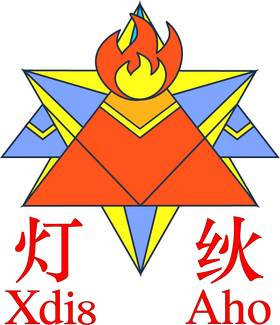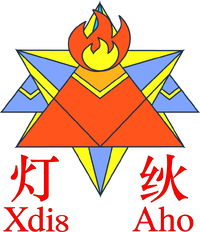Shidinn language
| Shidinn | ||
 Totem of Shidinn alphabet by 雨落寒江 | ||
| Chinese in Shidinn Script | ||
| Inventor | Huáng Quèfēi | |
| Invented in | ~1990s | |
| Illustration and usage | Unknown (2020) | |
| Speakers | Unknown (2020) | |
| Language family | Constructed language
| |
| Language codes | ||
| ISO 639-2 | art[1]
| |
| Customized | xd
| |
The Chinese in Shidinn Script (Shidinn: , Pronunciation: /ɕitjẽɪ̃ axo fʋ̩nzɐomu fatʷʰeɪji/), commonly named Shidinn, is a constructed language invented by folk linguist Huáng Quèfēi. The grammar and vocabulary of Shidinn are mostly from Modern Standard Chinese and Shàoyáng dialect imported with Shidinn Hanzi (Fiyifnzaos) and sometimes influenced by idiolect as well as English, Japanese, Korean, etc. among popular culture. The pronunciation of Shidinn Hanzi is developed through imitation of construction of Hanzi.
History
Named Xīnyǔ (新语, “the new language”) at first, Shidinn is developed by Huáng Quèfēi in 1990s. It was renamed Xīdīngyǔ (西丁语) no later than 2017 and Xīdǐngyǔ (希顶语) in 2018, both being transliterations of Shidinn (, “lamp, torch”).
There are two reasons why Huáng was to invent Shidinn: alphabetical writing of Chinese and deprecation of homophones. Hanzi was not plain sailing in digital world in 1990s. A new form of Chinese with alphabet would be easy for computer handling just like most of the languages. Huáng believed that this will “internationalize” Chinese and make it easier for foreigners to grasp. Moreover, homophones are frequent in Chinese and, to make matters worse, there are no difference between n and l in some dialects. A Chinese variety without homophones will decrease mistakes of reading and writing. [2][3]
Shidinn is mostly from Huáng’s inspiration. Huáng lived his life with adversity, in order that the draft of Shidinn is often completed in sorrow. He said, “My inspiration may come out when I was hypnopompically lying in the bed, as if my soul were soaring over my body”. The outline of Shidinn is hence formed gradually.
Huáng wishes Shidinn attains official recognition. So he went to Beijing twice, attempting to submit Shidinn to the government. The lack of budget forced Huáng to wander in Beijing. However, his efforts all ended up with failure. Huáng, desperate, switched his attention to netizens, and therefore posted Shidinn works online.
On January 19, 2020, Huáng asked on Zhīhū that “I suffered from chronic disaster since I invented Shidinn alphabet. Have I ruffled the Creator[4]? And, for my rather sorrowful life, should I destroy Shidinn alphabet?” (我创造了希顶字母,从此以后灾祸不断,是不是我触怒了天神,以之如此悲哀的人生,我是不是该毁灭希顶字母?)
On February 18, Raymond posted “Shidinn Language” Reveal on Zhīhū, which drew the attention of professors and amateurs in linguistics and created an upsurge of incubation and development of Shidinn.
On September 5, Nyoeghau released the first version of the very first Shidinn font Gentium based on Gentium Plus, an open source font.
On September 17, Nyoeghau and 然後 established Zhīhū topic “Shidinn”. On October 19, QQ group of Shidinn was complete. On December 16, Bìlībìlī account @Xdi8Aho希顶社区 was complete. On January 18, 2021, Shidinn Wiki was complete.
Notes
- ↑ ISO 639-2 and ISO 639-5 also have the code
artfor other artificial languages. The BCP 47 subtagxcan be used to create a suitable private use tag for any constructed language that has not been assigned an official language tag (e.g.,art-x-solresolcould be used for Solresol; See wp:Codes for constructed languages). This website useart-x-xdi8for Shidinn language. - ↑ 黄雀飞. 希顶字母华语创造者的采访传摘(一个朋友写的). https://www.bilibili.com/read/cv8981349/
- ↑ 黄雀飞. 我为什么要创造希顶字母? https://zhuanlan.zhihu.com/p/112110638
- ↑ In Chinese mythology, people who did marvelous achievement often ruffled the Creator.
